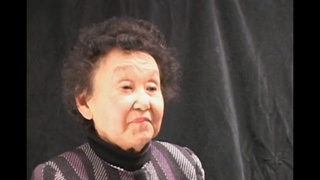Interviews
Arriving at Poston
When we got to Poston, it was hot; it was dusty. Each person, we were in a room about this size. We got off the bus and they handed you this sack and said, “Go to the back with it.” So you grabbed this big, huge sack and go out and this straw and you fill it and that’s your mattress. And all they had were a cot for each person and the mattress and they had blankets for you. But the thing was, there was no place to hang clothes, nothing. Nothing to even sit on, you know? And then the bathrooms were just one bathroom for each block. So there were just like 35 toilets and a shower thing, it was just a room that had all these showerheads on it. And then you washed your clothes in a tub that they had there.
Date: August 27, 2012
Location: Washington, US
Interviewer: Cindy Nakashima, Emily Anderson
Contributed by: Watase Media Arts Center, Japanese American National Museum with support of NITTO Tires Life History Project. Courtesy of the USC Hapa Japan Database Project.








